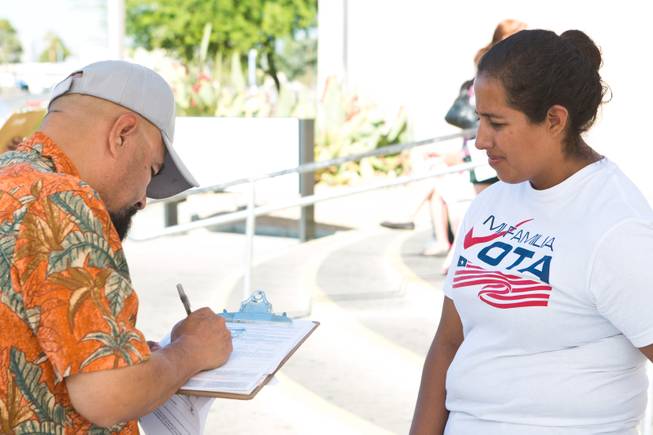
Stephanie DeJesus, at right, helps a voter fill out a registration form outside the E. Saraha DMV, Friday Sept. 12, 2014. DeJesus is a field registrar for Mi Familia Vota, a non-partisan organization that encourages civic engagement among the Hispanic community.
Monday, Oct. 27, 2014 | 8:41 a.m.
Editor's note: This is part of a weekly series, Senate Showdown, in which the Las Vegas Sun politics team shares news, links and insights on Nevada Sen. Harry Reid and the 2014 battle for the U.S. Senate. Readers can also submit questions at [email protected] or via Twitter using the hashtag #AskAmber.
WASHINGTON — We're into the final week of campaigning for this election. In just eight days, Nevada Sen. Harry Reid will know if he will still run the U.S. Senate.
The campaign to control the Senate is the defining storyline of American politics in the Nov. 4 election, and Reid is one of the main characters.
Forecasts predict Republicans could have a slight majority in the Senate. An unpopular Democratic president and the first national election since the 2013 implementation of Obamacare helped create a tough environment for Senate Democrats up for re-election in red states.
If Republicans gain a net six seats, they would control both chambers of Congress for President Barack Obama's last two years in office. And Reid would lose control of the Senate after ascending to majority leader in 2007.
This election is going to come down to the wire, and there's still room for a late-October surprise. Neither Reid nor Republican Nevada Sen. Dean Heller are up for re-election this year. But the Las Vegas Sun politics team will share links and insights on the Senate showdown leading up to the election.
What do the polls say?
First, let's look again at the numbers. Control of the Senate hinges on the outcome of races in states like Iowa, Georgia, Louisiana and Colorado. National Journal has an interactive map that lets you track the polls for each state. In the aggregate, Republicans have anywhere from a 68 percent chance to a 63 percent chance to take the Senate. That's according to statistic-driven models at The New York Times election lab, The Washington Post election lab and FiveThirtyEight Senate forecast, which use slightly different methodology. All come to the same conclusion that this election cycle is and has been favoring Republicans.
Does the Hispanic vote really matter in 2014?
We noted last week that Latino voters, upset by Obama's inaction on immigration reform, look increasingly likely to sit at home instead of vote. But that may not change the outcome of this election. The New York Times' Nate Cohn analyzed Republican support this midterm and came to the conclusion that the GOP could keep control of the House of Representatives and take control of the Senate even if it lost every single Hispanic vote in the country. That's an astounding statistic that Cohn says helps explain why immigration reform isn't a priority among Republicans in Congress (with the exception of Nevada's Republicans, one could argue.) The Hispanic vote will matter more come 2016, when Reid is up for re-election and there's likely to be a competitive presidential race that will bring out the Democratic vote.
Conservative groups catching up to Democrats in fundraising
More bad news for Democrats comes in dollar bill signs.
Democrats' saving grace this election cycle has been the fundraising prowess of the Reid-affiliated Senate Majority PAC, an outside group that has spent millions to protect Democrats in red states.
But top conservative outside groups sounded the alarm bells in response and managed to collect an eyebrow-raising $30 million in September, according to Politico's Ken Vogel. The last-minute spending, such as American Crossroads' $822,000 ad buy against Nevada's Democratic Rep. Steven Horsford, could change the status of races in the Senate and the House.
A Senate in limbo until 2015? It could happen
A key race in the battle for the Senate is in Louisiana, where Democratic incumbent Mary Landrieu is in a tight race against GOP Rep. Bill Cassidy.
Per state law, many observers expect that race to go to a December runoff if neither candidate gets more than 50 percent of the vote on Nov. 4. But Alexandra Jaffe of Capitol Hill newspaper The Hill points out a runoff in equally competitive Georgia could leave control of the Senate undetermined until January.
NPR's Ailsa Chang reports on Democrats' creative efforts in predominantly African-American churches in Atlanta to make sure that doesn't happen.
Politics in 2014: Just the 1800s
Led by Obama's ground-breaking, data-driven get-out-the-vote
strategy in 2008 and 2012, both Republicans' and Democrats' national parties are using increasingly sophisticated technology to track and target potential voters. But once parties find potential voters, establishing and keeping relationships with them is surprisingly
low-tech. That's the conclusion NPR's Mara Liasson drew when she traveled alongside Republicans using this technology in North Carolina. Expect to
see this kind of campaigning in Nevada in 2016.

Join the Discussion:
Check this out for a full explanation of our conversion to the LiveFyre commenting system and instructions on how to sign up for an account.
Full comments policy